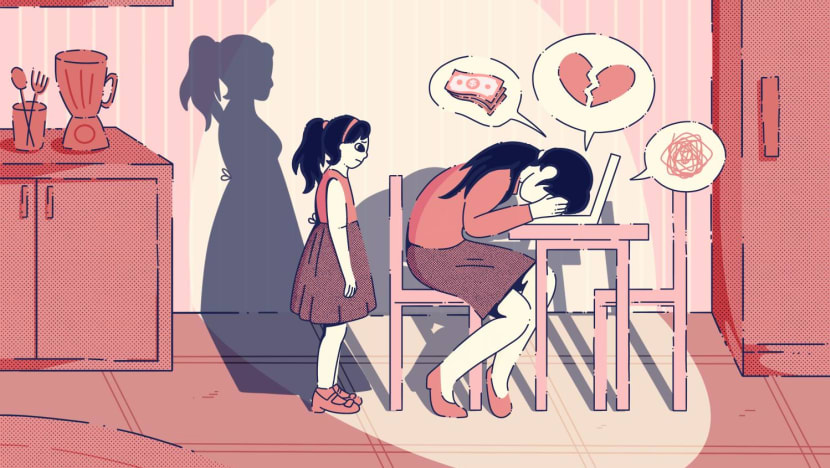Adulting 101: As an eldest child, I grew up prioritising others' needs. Now I am learning to put myself first

SINGAPORE — As the eldest of four siblings, I grew up accustomed to shouldering domestic responsibilities such as doing the household chores, taking care of my younger siblings and handling all administrative work. As I grew older, I took on more responsibilities, such as paying for all the household bills.
Though I accepted these responsibilities as the eldest daughter, the reality is that it can be very tiring to carry so much on your plate. I also felt lonely and anxious having to navigate such problems by myself at a young age.
So when I chanced upon a commentary by Associate Professor Yang Hu from the Department of Sociology at Lancaster University on the "eldest daughter syndrome", I felt seen as the article described what I have been going through. The article was published on the not-for-profit news network The Conversation.
Around the same time, I came across a few TikTok videos of women talking about their experience of what they termed "eldest daughter syndrome".
In these videos, women who are the eldest daughters in their families lament about their plight of having to take on the domestic, emotional, and sometimes economic responsibilities in the family.
However, I was slightly skeptical whether the "eldest daughter syndrome" exists. If it does, do only eldest daughters experience it? What about eldest sons, or younger siblings for that matter? And what can be done to mitigate the problem?
To find the answers, I spoke to experts to understand more about this term.
THE CORRECT TERM TO USE IS PARENTIFICATION
In an interview with CNA938 on April 13, Prof Hu said that the "eldest daughter syndrome" refers to the domestic, cognitive and emotional burden that eldest daughters are expected to carry from a young age.
This phenomenon is more prevalent in societies with higher gender inequality. After all, the reason why it has been called as such instead of the "eldest sibling syndrome" is because of the conservative expectation that women and girls should take on extra household and caring responsibilities.
However, Dr Praveen Nair, senior consultant at Raven Counselling and Consultancy, said that terminology is not well-researched, and people should be wary about the use of such terms.
“The word ‘syndrome’ also implies a disorder. In our profession (psychology), all disorders have to be listed in a diagnostic and statistical manual of mental disorders. We have to be careful when using such terms if they are not part of the manual,” he said.
“We also don’t want to associate a mental disorder with women. It may be dangerous, as some may misconstrue the term to justify that women are somehow more susceptible to mental health disorders.”
Counsellor Clarice Ng from psychological consultancy Mind What Matters also said that the experiences of all eldest daughters should not be generalised.
“There are many other factors that can also contribute to an individual’s development, such as their relationship between family members and the age difference between siblings,” said Ms Ng.
Still, Dr Praveen said the issues associated with the "eldest daughter syndrome" are real, such as parents overly relying on the first child to take care of the younger siblings.
The accurate term to describe the issues associated with the "eldest daughter syndrome" is “parentification”, he added.
Parentification happens when a child is forced to take on responsibilities that typically fall on the parents, without properly explaining why or providing them adequate support.
Dr Praveen said that this can happen to any child, regardless of their gender or birth positions.
However, it may manifest differently in boys and girls due to cultural interpretations of gender roles.
For example, parentification in daughters may manifest as expectations of shouldering domestic chores from a young age, while sons are expected to be adept in household tasks that are traditionally seen as "masculine" or to financially provide for the family.
Parentification may also be amplified in families from lower socioeconomic backgrounds or in families where children do not get enough support from parents, he said.
I felt relieved at the experts’ unpacking of the term, as I learned that I should not jump to conclusions about my own experience, even as I resonated with women who identified with the term.
For me, knowing that such a phenomenon is not a predetermined one for all eldest daughters brought me some measure of comfort, as I now know that are factors involved that can be mitigated or addressed.
Agreeing, Assistant Professor Zheng Mu from the department of sociology and anthropology at the National University of Singapore said that parents in low-income families are more likely to rely on eldest children for domestic, or even financial support, due to economic limitations.
HOW PARENTIFICATION IMPACTS CHILDREN
To Prof Mu, parentification may lead to negative consequences for the child involved since they are subjected to greater burdens, both physically and mentally.
“This may result in them having to compromise their dreams, goals and time, which may affect their self-actualisation,” he said.
Ms Ng also said that children who are placed in a domestic responsibility role from a young age might miss out on age-appropriate and important developmental milestones.
For example, they may choose to prioritise their responsibilities at home at the expense of missing out on socialising with friends, which is necessary to develop a sense of personal and social identity.
Another effect of parentification is that children grow up believing that their needs are secondary to others, she added.
“At a young age, they might have had to cope with competing personal and family interests, such as wanting to go out with friends versus taking care of their siblings at home,” said Ms Ng.
“It is possible that they might learn to cope by pushing their own needs aside in order to bring harmony and happiness to the family.”
Though it is good to bring happiness and wanting to help in the family, a child who grows up believing that their needs are secondary might carry these same beliefs into future relationships, she added.
WHAT CAN BE DONE?
For children who have been parentified, Dr Praveen said that there are some mechanisms that they can take to heal from their experiences, such as seeking therapy.
“This is especially if one is constantly reliving and revisiting events with an eye towards feeling angry and/or guilty, and especially vital if there is growing hostility towards caregivers,” he said.
They can also practice self-care by taking care of their physical and emotional needs, such as connecting with others, such as finding support and strength from social networks, particularly from those who have had similar experiences.
“It is also important for people who have been parentified from young to learn to set boundaries. This can be in everyday contexts, such as work or with friends,” he said.
Agreeing, Ms Ng said that family members should communicate and foster mutual understanding.
“Children who are shouldering a lot of responsibilities should know that their needs are important and their feelings are valid too, and should communicate this with their family, if appropriate.
“For family members, just listening and acknowledging the struggles of the child can be in itself very healing to the relationship. There may be no quick fix to the distribution of the tasks, but communicating is a great starting point,” said Ms Ng.
Speaking to the experts has made me more aware of how I can take care of myself and my needs first before extending myself to others, even if they are my family members.
The first step is to express my needs or reach out for help when I need it, even if it may not be easy or what I am used to doing.
Ultimately, Dr Praveen said educating oneself about parentification and its potential long-term effects is an important first step to understanding and healing from such experiences.
It is important to note too that children who have been parentified may experience different outcomes, he said.
“Parentification can actually have a good flipside. Some people who have been put to carry such responsibilities actually become more resilient and very responsible,” he added.
“But this outcome is also dependent on how parents assign tasks and responsibilities to the child, whether they do it lovingly, and properly explain to the child while being supportive and appreciative of them.”














